When there is trouble in the herd – one horse picking on another, or a horse or horses continually picked on by the others, the Liberty Foundations can help.
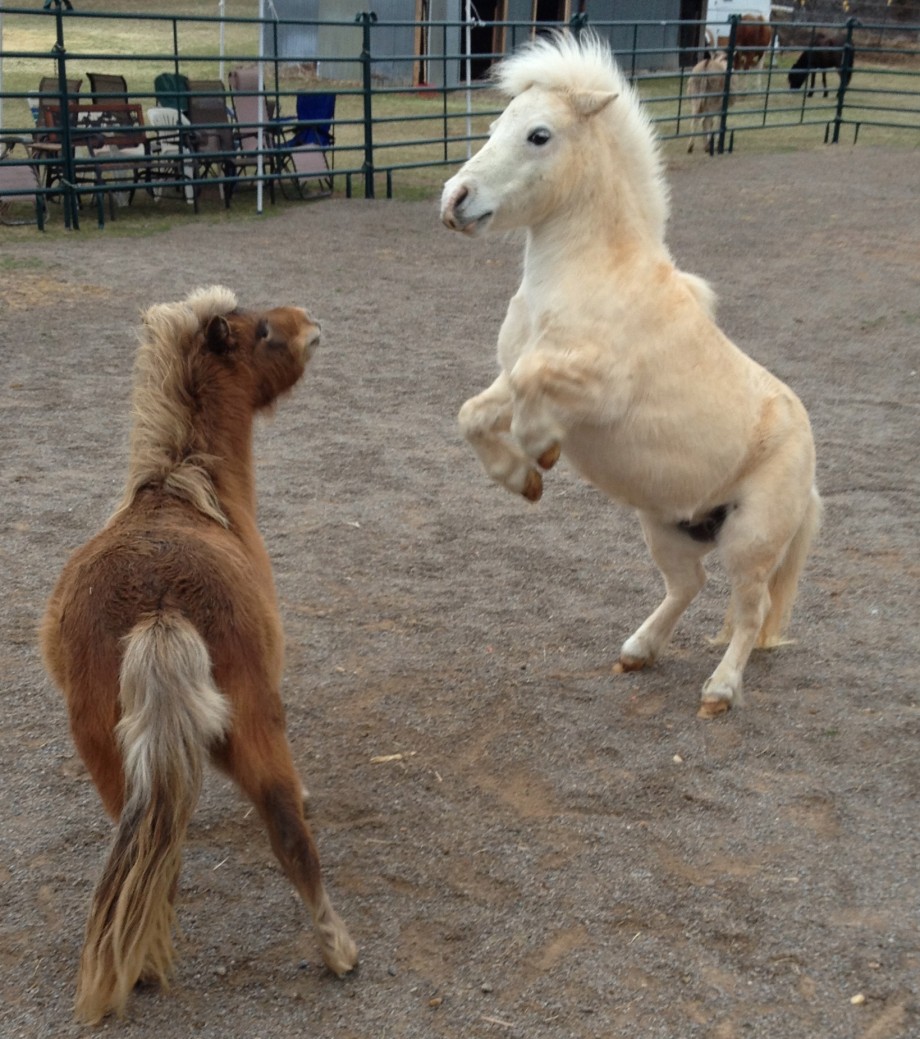 It may seem unlikely that we humans could have an effect on the herd dynamics since we’re not there to act as “policemen” all the time. However, what we do for the horse in the foundations is re-establish familiar rhythms, calm whatever is inside the horse that makes it difficult for her to connect with the other horses. We can also help the other horses to see the picked on or aggressive horse differently – either see the inner glow of the horse or stand up for themselves or ignore the aggressive horse.
It may seem unlikely that we humans could have an effect on the herd dynamics since we’re not there to act as “policemen” all the time. However, what we do for the horse in the foundations is re-establish familiar rhythms, calm whatever is inside the horse that makes it difficult for her to connect with the other horses. We can also help the other horses to see the picked on or aggressive horse differently – either see the inner glow of the horse or stand up for themselves or ignore the aggressive horse.
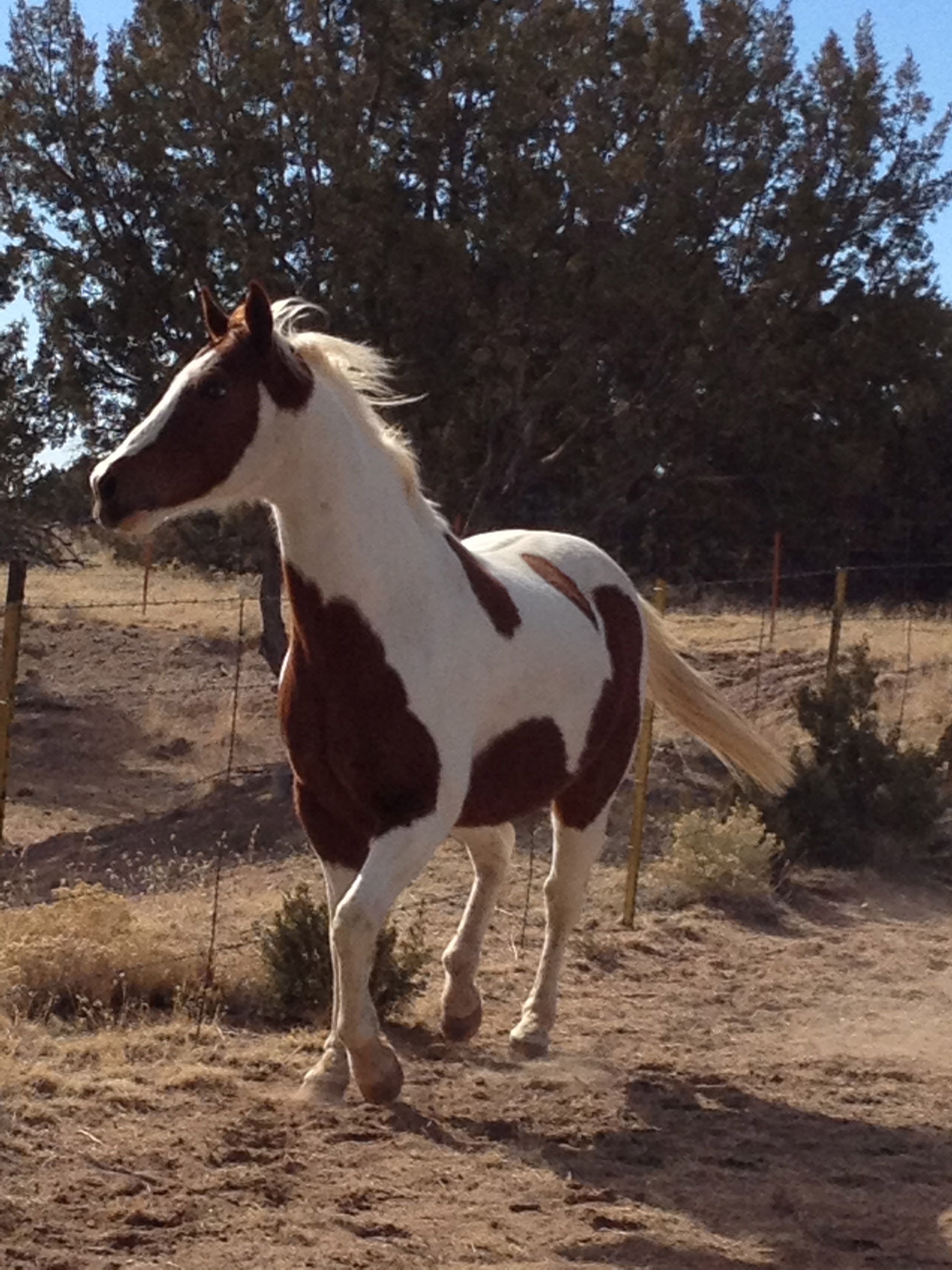 In the wild, horses break off into bands and generally select those who they want to hang out with, much like we do in life. If we surround ourselves with those who don’t reflect the beliefs we have, then we are not very happy. Just because we plop horses together doesn’t mean they’re naturally going to get along. Particularly older horses can have trouble in herds if one of the horses or a group perceives the older horse as a threat because he can’t move as fast or has trouble thinking. Horses can be very intolerant of those members of the herd who can’t think straight.
In the wild, horses break off into bands and generally select those who they want to hang out with, much like we do in life. If we surround ourselves with those who don’t reflect the beliefs we have, then we are not very happy. Just because we plop horses together doesn’t mean they’re naturally going to get along. Particularly older horses can have trouble in herds if one of the horses or a group perceives the older horse as a threat because he can’t move as fast or has trouble thinking. Horses can be very intolerant of those members of the herd who can’t think straight.
Here are some case studies of horses who have benefitted from the Liberty Foundations in their herd settings:
a) A horse, let’s call him Mike, who keeps chewing on his older stablemate, Sal’s, neck. The owners put some 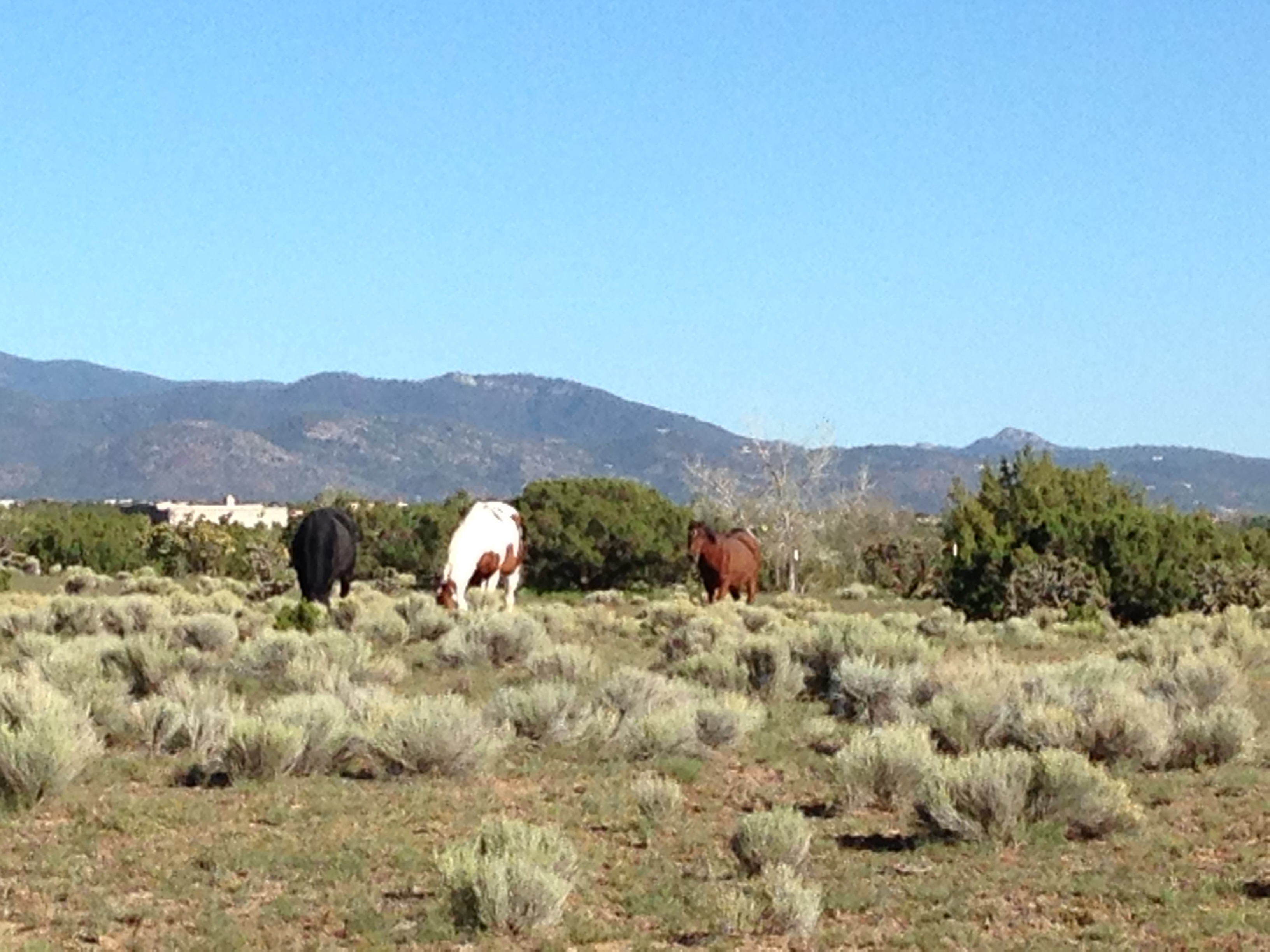 product on the old gelding’s neck to keep Mike from chewing on him. Mike is a horse who has been the low guy on the horse pecking order in every herd situation he’s ever been in. He has also been deprived of food at times in his life. I just look at the entire horse picture to see what factors might be contributing to his current behavior.
product on the old gelding’s neck to keep Mike from chewing on him. Mike is a horse who has been the low guy on the horse pecking order in every herd situation he’s ever been in. He has also been deprived of food at times in his life. I just look at the entire horse picture to see what factors might be contributing to his current behavior.
Mike benefitted from some one-on-one time with his owner, working with the Foundations, specifically those that involved food. Also trail rides, because there seemed to be something tied in to his self-esteem. He is a proud horse and needs to have a job. I also thought that although Mike had an attachment to Sal, he wanted to be with another herd. Once Sal died, Mike was moved in with the herd he wanted to be with, and he never chewed on anybody again. Nobody chewed on him either!
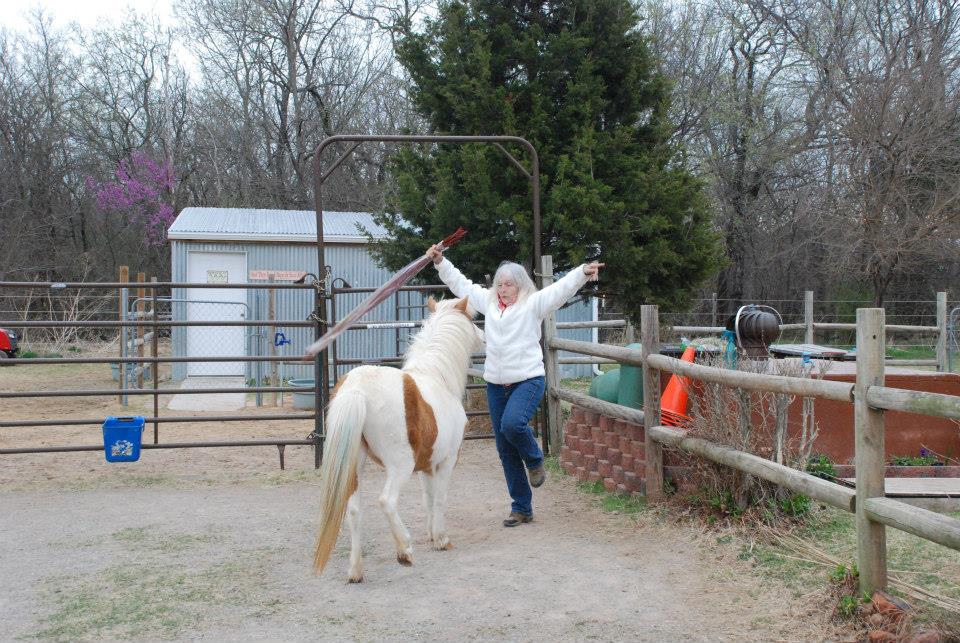
b) The very powerful, full-of-himself horse who has difficulty in his relationships with other horses, always bullying and bossing them around. I think this was driving his owner a little crazy, even though she loved him a lot.
The way he reached out to greet her when we did the greeting exercise was as though she was beneath him. He had this air of visiting royalty, deigning to shake hands with a peon. He did not do that with me; he extended his neck in curiosity but not with that same haughty attitude. I thought that was where her problems with him lie. He felt he was in charge of every situation, even though she is an excellent horsewoman.
Our job was to get him to recognize her as the leader and enjoy that relationship. She did not have to take his leadership away from him, only make sure he recognized her and show him some interesting options. We accomplished this in the lesson by also working with her approach, and she went home to try it out in the context of the herd. Her horse began to treat the other horses with more respect also.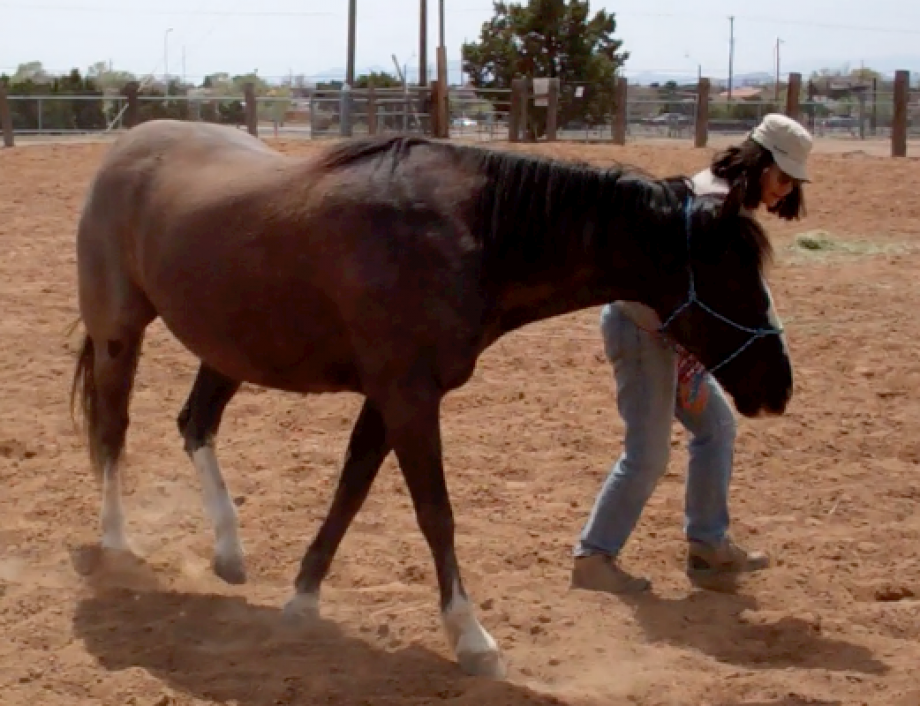 In turn, the other horses began to set up better boundaries for themselves.
In turn, the other horses began to set up better boundaries for themselves.
With this horse, I recommended that she keep up the work, because he may backslide to his old ways if not reminded of his place in the “universal herd,” meaning including the humans. This type of horse has a long history of this behavior and way of relating to others, so it takes time for the new neural pathways to be activated on a regular basis without some reminders. My very strong-willed horses need to be reminded and I can usually tell when it’s time to do certain foundations with them.
Part of why this works so well in a herd is that horses copy each other. Their mirroring extends far beyond standing looking off in the distance together to watching and learning from each other. Be careful what you model because they will copy you too! This is actually a powerful tool in the training of horses. Once they recognize our leadership, they can and will copy what you do or ask them to do.
c) Horses who seem not to get along with any other horses. A mare who kicks out at everyone around and needs special fencing to separate her from other horses so she doesn’t damage herself or others. In herd situations, she is unhappy and doesn’t get along with anyone. It is amazing to me that she functions so well with humans.
Elementary Foundations such as sitting, walking a horse down, deepening connection, repeated in varying ways, helped this mare get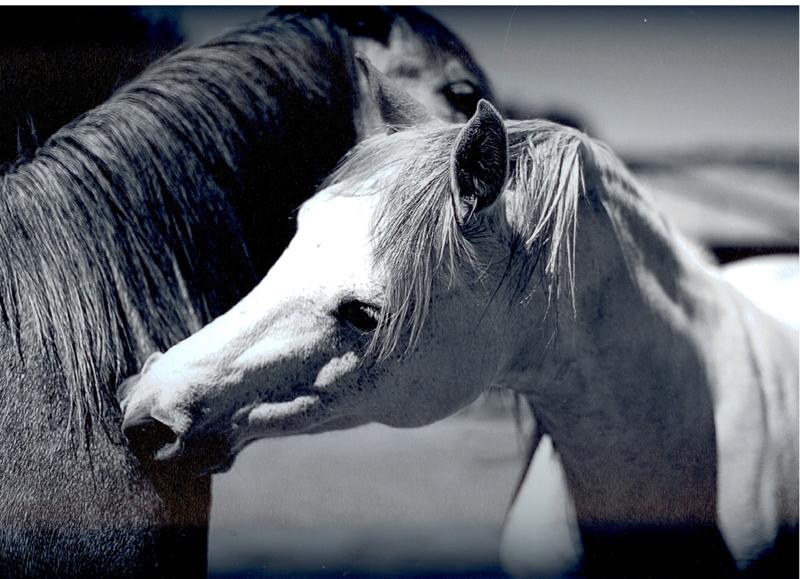 comfortable and form some relationships. I see this sometimes with horses who have been kept in stalls with very little turnout. Also the turnout they get is separate from other horses, perhaps because they are expensive horses and the owners are afraid they will interact with another horse and hurt themselves. The horse lacks a sense of community, is lonely, and can’t properly practice the natural rhythms of interaction – mutual grooming, running together, mirroring, etc. that form the tempo of a healthy horse’s life.
comfortable and form some relationships. I see this sometimes with horses who have been kept in stalls with very little turnout. Also the turnout they get is separate from other horses, perhaps because they are expensive horses and the owners are afraid they will interact with another horse and hurt themselves. The horse lacks a sense of community, is lonely, and can’t properly practice the natural rhythms of interaction – mutual grooming, running together, mirroring, etc. that form the tempo of a healthy horse’s life.
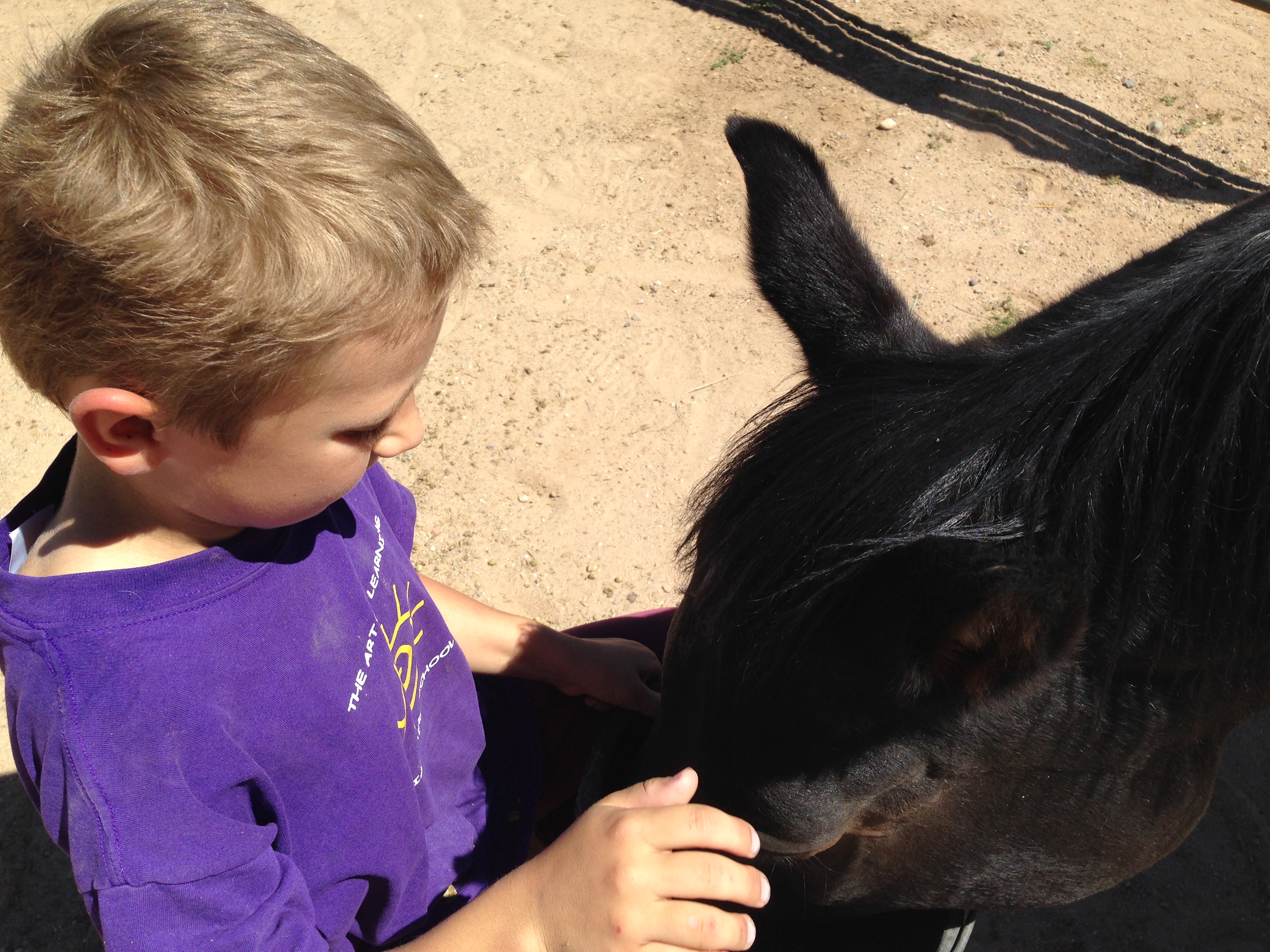
d) The horse who has been separated from its mother prematurely. We begin to see this more frequently these days as a result of massive roundups conducted by the BLM, in which dams are separated from their foals. Whole families are separated, and the foals come out of it shell-shocked, without the necessary social skills to go forward in life. They are like foster children, lost, frozen in time, unloved in a deep sense because they lack nurturing, yearning for what they haven’t had, yet they don’t know what that is.
The program for this horse is very much like for Horse c in the list above: working on establishing connection, the work around food that helps the foal know when to eat, and when not to eat. Re-establishing the rhythms she or he has lost by not having a mother to do it.
e) Horses who are herd bound – will not leave each other without a big scene. We can work with the horse by sitting in the space he shares with other horses, or putting him in an adjacent corral. It may take some time but eventually the horse will separate from the herd. You can also take the horse for walks a short distance away once you can walk side by side and always bring him back to the herd. He learns that he will always be rewarded by coming back to the herd, and that walking with you is really nice too. You can also try walking with the herd.
Even if there is nowhere to let a horse out, owners can walk their horses, take an interest in the grass they eat along the roadside, keep up a conversation, either silent or spoken, being in companionship. Companionship with at least one other living being can help a horse enormously in their relationships with others.
*****
Keep an eye on the calendar as more events will be added as they are planned.
Services: Bodywork: (Ortho-Bionomy for people, Equine Ortho-Bionomy, Equine Positional Release (EPR)): private sessions, tutorials, phone consultations, Horse & Rider sessions, clinics, distance healing communication and gift certificates
Liberty Coaching: clinics, mini-clinics, workshops, private and semi-private sessions, tutorials, consultations: by appointment: 505.501.2478 or emailing susansmith@orthohorse.info Scheduling now. Contact me for details.
Let me know if you want to do a clinic in your area. Prices will vary according to location & travel costs.
April 10-12 – Spring Liberty Weekend in Oklahoma — Susan Smith and Ruella Yates, co-instructors. Contact either of us: susansmith@orthohorse.info or ruella@libertyfoundations for further details.
 Photo credit: Catherine Sobredo Photography
Photo credit: Catherine Sobredo PhotographyApril 25 – HOLD YOUR HORSES! AN INTRODUCTION TO EQUINE POSITIONAL RELEASE
Time: SATURDAY 9AM – 4PM $130 Early Bird paid before April 10 – $140 after April 10. Payments are non-refundable after April 10.Learn how to do some effective bodywork in this introductory course.Equine Positional Release, (EPR), is a non-force modality devised by founder Zarna Carter, from her training in Ortho-Bionomy and Homeopathy.
EPR works with the body’s ability to self-correct. By giving the body specific choices, it finds available corrections.EPR can effectively address acute and chronic injury patterns, structure, tendons & ligaments, illness, organ imbalance, fluids, lymph, neurological imbalances, lameness, and much more.Susan Smith is a registered advanced Ortho-Bionomy practitioner, Equine Ortho-Bionomy and EPR practitioner & Teacher Trainee with a practice for both people and equines.To enroll, please contact Susan at 505-501-2478 (cell) or 505-983-2128 (home) Email susansmith@orthohorse.info.
A PayPal option will be put on www.orthohorse.info Space is limited; please contact Susan for an enrollment form and to arrange payment.
Who will benefit from this work?
All horses and humans, but specifically:
- Horses who have not responded to traditional natural horsesmanship
- Horses who have been frightened, abused and in other ways traumatized
- Horses who may be aggressive or too passive in their herd situations
- Horses who have problems with humans
- All humans who may be puzzled about relationship with horses and want to deepen their connection.
December 7-11 Sahaja 2015 5-Day Clinic on the island of St. Vincent in the Caribbean – Susan Smith & Stina Herberg. See details:
Independent Liberty Trainers Network
Susan & Stina Team Up to Make the Sahaja Clinic an Unforgettable Experience
Susan is a member of the Independent Liberty Trainers Network. libertytrainersnetwork.com/



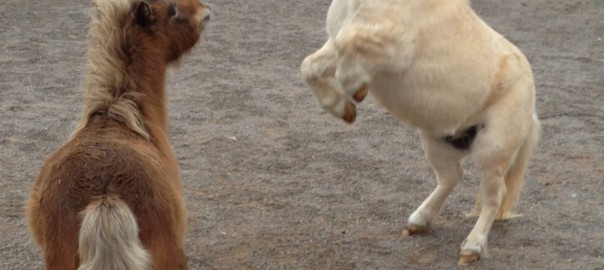
I very much like the case studies in this blog post, and how the Liberty Foundations helped each horse become a happily-functioning member of the herd!
Thank you!
Ruella Yates